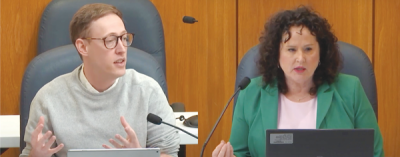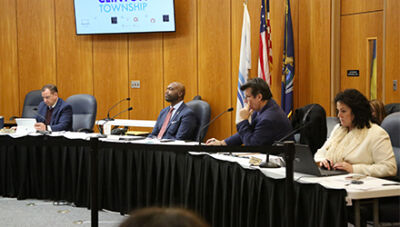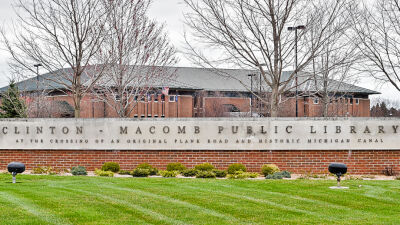
Clinton Township Trustee Mike Keys, left, and Township Clerk Kim Meltzer, right, traded barbs throughout the Clinton Township Board of Trustees April 8 special meeting.
Screenshots taken from Clinton Township Board of Trustees meeting broadcast
CLINTON TOWNSHIP — Things got heated at a Clinton Township Board of Trustees special meeting at noon on April 8, the day of the eclipse, culminating in supervisor Bob Cannon breaking his gavel.
“It was Kim (Meltzer) trying to do her thing and Mike Keys trying to do his thing,” Cannon said following the meeting.
Cannon said he understood Keys’ passion. He said he had the same drive when he first got involved in government, but strongly disagreed with Keys’ methods.
Keys said he was surprised by the tone of the meeting.
“Bob Cannon’s aggression and unprofessionalism is something I’ve become accustomed to,” he said.
Clinton Township Clerk Meltzer said she was disappointed about the division on the board and surprised the meeting took the turn it did. She said she’s not able to be the clerk she was voted in to be.
“It’s unfortunate that this board is not more understanding,” Meltzer said.
Early voting
The conflict at the April 8 meeting started over early voting, which was OK’d last year with the passage of Proposition 2 in Michigan. Trustee Mike Keys was opposed to having extended voting take place at churches.
Early voting in Clinton Township will take place at Kensington Church and Faith Baptist Church. The Clinton Township Civic Center will also be utilized as a polling location. Meltzer said places like Partridge Creek Mall were considered, but a nonprofit location seemed like the best option.
“The issue with a private sector location would be that at any given time they might not want us there because it’s not financially a benefit to them,” Meltzer said.
In neighboring communities, voting in churches occurs. For example, Shelby Township uses four churches as polling places and Roseville uses two.
Meltzer said other nonprofits were considered but that they didn’t work as well as the churches. She said Macomb Community College was an option but didn’t work because classes would have to be halted for the 9-day duration of early voting.
“We think that’s a really good display of democratic consideration,” Meltzer said about selecting the churches.
Keys said that people who may have a bias one way or the other about churches may be influenced to vote a certain way. He cited a 2008 Stanford study that supported his view.
“By being in a room full of crucifixes and walking into a polling location that implies some of these issues, it can create a bias,” Keys said.
“What our research suggests is that it might be useful to further investigate influences such as polling location to better understand how such factors affect different types of voting situations. From a policy perspective, the hope is that a voting location assignment could be less arbitrary and more determined in order to avoid undue biases in the future,” wrote S. Christian Wheeler, one the study’s researchers, as part of the published study.
Following the meeting, Treasurer Paul Gieleghem explained that coordinating with schools for early voting could be possible. Gieleghem said that he helps coordinate the Clinton Township Community Blood Drive with schools throughout the township without a hitch. He said, in theory, the schools could accommodate early voting during the 9-day period.
“Both Clintondale and Chippewa Valley schools have opened up their buildings as blood donor sites,” Gieleghem said. “They know how to build in the necessary protections to keep students safe and make sure the buildings are accessible to donors.”
During public comment, resident Sam Buschell agreed, saying he and other residents were not in favor of using the churches as polling places.
“We don’t want this in churches,” Buschell said. “I went to Catholic school, and I’ve got a sister who’s been a nun for 60 years. I’m not against churches, but it’s not the place. We have a bunch of public buildings.”
Meltzer took issue with Keys’ claim that she hadn’t examined the potential bias for voters resulting from the use of churches as early voting sites.
“Those are things I definitely have considered,” Meltzer said.
Meltzer said other places could influence voters, such as schools. She said if a millage is on the ballot for school funding, it could sway voters one way or another to vote there. The Stanford study examined schools and concluded they could also hold a bias. However, she said she did look for potential conflicts in the churches when they were selected. Faith Baptist didn’t have a conflict and Kensington Church agreed to remove a large crucifix on display.
“They agreed, they were not at all bothered by that,” Meltzer said.
Meltzer said in the past, other elections have been held in churches without incident.
During public comment, members of the community agreed that allowing early voting to take place at churches was no big deal.
“If we’re going to ask churches to remove any references to God, Jesus, the cross, any of that, let’s make sure that we have any other secular objects removed that may be offensive to anyone,” Dana Dugger said. “That we have rooms that are sterile and vacant.”
Cannon said, while he disagreed with those against using the churches, he welcomed the debate about the sites.
“I can tell you this, I know Mrs. Meltzer has worked very hard, not only on this election but others, to make sure there are polling sites that are fair for all who live in the community,” Cannon said. “If you’re offended, vote on voting day or vote absentee. There are a lot of options.”
The motion to hold the election at the sites ultimately passed. Cannon, Meltzer and Trustee Dan Kress voted yes. Gieleghem and Keys voted no.
Compensation Commission
Keys introduced an item on the agenda to dissolve the township’s Compensation Commission. He said he’s been opposed to the commission since its inception due to the lack of transparency of the board.
“Compensation commissions are inherently less transparent and less accountable,” Keys said. “The commissions’ recommendations for pay raises are never required to come and be voted on by this board. Instead, the commission’s determinations are automatic unless a two-thirds majority of this board rejects the commission’s decision.”
Meltzer disagreed with Keys, saying that having an independent commission that handles the pay increases is the best way to do it. She encouraged the public to attend the meetings.
“That’s what these people were really assigned to do,” Meltzer said. “To do the research on whether or not this board has served the public. I like that scenario. I think that is transparent.”
“I think (it’s) a good idea to get rid of this (commission),” said resident John Grossenbacher during public comment. “Have your open meetings. A lot of stuff in the township is done administratively, out of sight of the citizens. I think it’s really time to stop that.”
Dugger said during public comment that the public needed more information about this commission to decide. Cannon agreed. Kress tried to put a finer point on the issues with the commission.
“Do you object to the makeup of it? Do we need more people?” Kress asked Keys. “From my understanding compensation commission members are residents of Clinton Township. In premise, I love that they have a say-so in pay increases and that sort of thing.”
“My issue with the compensation commission is not the makeup or the individual members,” Keys responded. “It is the idea that we should be passing the buck on the decision of how much elected officials make. We are the fiduciary responsibility for this township.”
Compensation commissions aren’t unusual. Warren and Sterling Heights both utilize them. The state of Michigan also has one. These commissions, like the Clinton Township commission, meet every few years. Clinton Township’s commission, which was established in 2017, includes Robert Hogan, Fate Carson, Darra Slanec and John Stroh. Members are appointed by the supervisor and are residents of the township.
At one point Meltzer discussed how there may be personal conflicts with the trustees if the commission were dissolved. She implied Keys wanted to dissolve the commission so, when he ran for an unnamed office, he would be compensated better.
“I was planning on running for trustee after the Monday meeting and, with everything that happened, I just needed a break,” Keys said after the meeting. “I have all intentions of filing for trustee in the next few days or so.”
During a heated exchange between Keys and Meltzer, one of many that took place during the meeting, Cannon tried to intervene as the two talked over one another. As he tried to let Meltzer finish her time, he used the gavel. The top half of the gavel flew off when struck, bouncing off a pole in the audience.
“Would you stop it?!” Cannon yelled after. “You are so doggone immature…Let her finish. You will have your opportunity to say what you want.”
Commission meetings take a little digging to find but are available on the township’s website. You can find them by clicking on “government” at the top of the page and clicking on “agendas and minutes.” Then, follow the link to the archived agendas. The easiest way to access the commission’s minutes is by clicking on the link “Text Search All Board and Commission Minutes.” Use the dropdown for “Board of Commission” and you can access the minutes.
The item would have been put to a vote at the board’s next meeting if it was agreed upon. The motion was not approved with Cannon, Meltzer and Kress voting no. Gieleghem and Keys voted yes.
 Publication select ▼
Publication select ▼


























